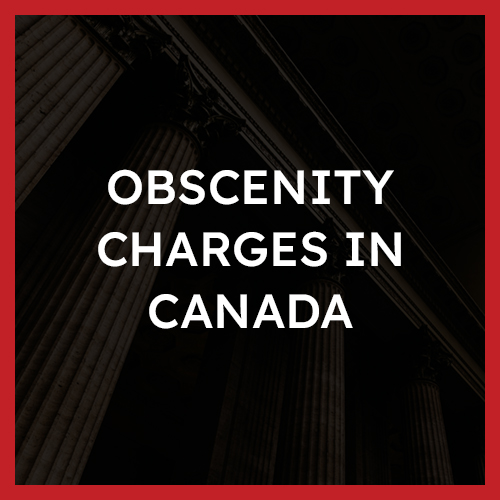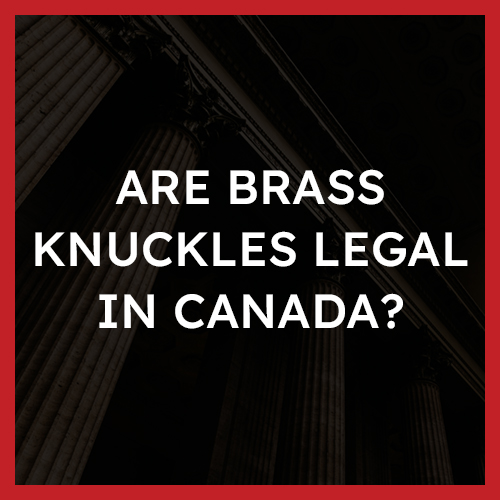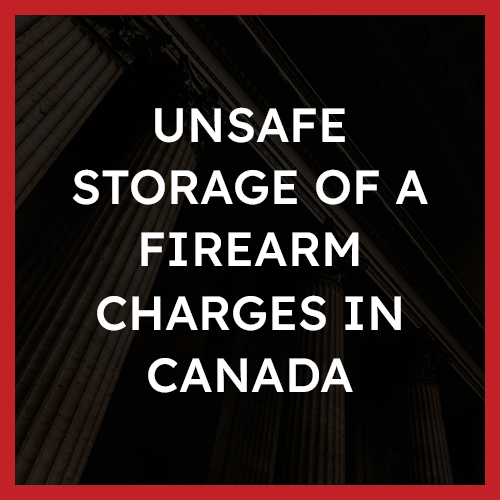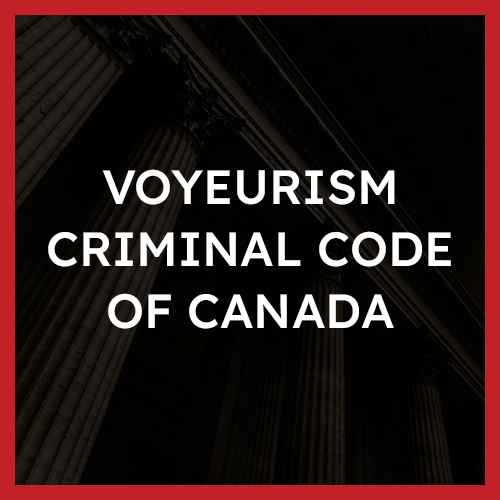Obscenity (s. 163) Laws in Canada
What is an obscenity charge?

To further elaborate on the definition of obscenity, obscenity entails the unjust exploitation of sexual content that surpasses the prevailing benchmarks of tolerance within the Canadian community. Explicit sexual depictions coupled with instances of violence almost invariably fall under the purview of undue sexual exploitation. Should explicit sexual content be both degrading and dehumanizing, it could be deemed undue if it carries a significant risk of harm. However, explicit sexual representations that lack violence, degradation, or dehumanization generally do not qualify as undue sexual exploitation unless they involve minors in their production. It’s worth noting that material not meeting the criteria for obscenity under this framework cannot be classified as such based on the recipient or the context in which it is displayed. The determination of obscenity does not hinge on the limited audience or market to which it is confined. Notably, mere nudity itself does not constitute explicit sexual content.
An obscenity charge is a hybrid offence with a Crown election. This means that depending on the circumstances of your case the Crown can elect to proceed by indictment or summarily. If an accused is prosecuted by indictment, there is a Defence election of court under s. 536(2) of the Criminal Code.
Examples
Some examples of an obscenity charge may include the following:
- Distributing sexually explicit magazines or videos that are considered obscene;
- Producing and creating explicit content that emphasizes sexual content in a degrading or dehumanizing manner;
- Possession of child pornography; and
- Creating or sharing graphic depictions of violence and sex.
Defences
The defences available to an obscenity charge are entirely dependent on the facts of your case.
However, some defences to an obscenity offence may include:
- The material created or distributed was not obscene;
- If the material has artistic, literary, scientific, or education value, it might not be considered obscene;
- By community standards, the material distributed or created was not beyond what is acceptable; and
- What was created or distributed did not extend beyond what served the public good.
Punishment
The offence of obscenity is a hybrid offence, which entails a maximum punishment as follows:
- Imprisonment for 2 years of the Crown elects to proceed by indictment.
- Imprisonment for 2 years less one day if prosecuted by summary conviction.
The penalties associated with an obscenity charge hinge on the particulars of your case. In instances where the offence is committed and subsequently prosecuted through indictment, the potential punishment can encompass a maximum of 2 years of imprisonment. Notably, there exist no stipulated minimum penalties for this transgression. Importantly, an accusation of obscenity carries substantial ramifications, extending to profound repercussions on both present and prospective employment prospects, as well as one’s immigration standing.
Overview of the Offence
According to s.163 of the Criminal Code:
Obscene materials
163(1) Every person commits an offence who makes, prints, publishes, distributes, circulates or has in their possession for the purpose of publication, distribution or circulation any obscene written matter, picture, model, phonograph record or any other obscene thing.
Idem
(2) Every person commits an offence who knowingly, without lawful justification or excuse,
- sells, exposes to public view or has in their possession for that purpose any obscene written matter, picture, model, phonograph record or any other obscene thing; or
- publicly exhibits a disgusting object or an indecent show.
- and (d) [Repealed, 2018, c. 29, s. 11]
Defence of public good
(3) No person shall be convicted of an offence under this section if the public good was served by the acts that are alleged to constitute the offence and if the acts alleged did not extend beyond what served the public good.
Question of law and question of fact
(4) For the purposes of this section, it is a question of law whether an act served the public good and whether there is evidence that the act alleged went beyond what served the public good, but it is a question of fact whether the acts did or did not extend beyond what served the public good.
Motives irrelevant
(5) For the purposes of this section, the motives of an accused are irrelevant.
(6) [Repealed, 1993, c. 46, s. 1]
(7) [Repealed, 2018, c. 29, s. 11]
Obscene publication
(8) For the purposes of this Act, any publication a dominant characteristic of which is the undue exploitation of sex, or of sex and any one or more of the following subjects, namely, crime, horror, cruelty and violence, shall be deemed to be obscene.
Punishment
169 Every one who commits an offence under section 163 [obscenity], 165 [tied sale], 167 [immoral thetrical performance] or 168 [mailing obscene matters] is guilty of
- an indictable offence and is liable to imprisonment for a term not exceeding two years; or
- an offence punishable on summary conviction.
The Guilty Act (Actus Reus)
The actus reus for an obscenity charge under s. 163 is established by proof, beyond a reasonable doubt, of the following:
- The accused at a specified date and time, in the correct jurisdiction, created or distributed sexually explicit material to the public, or possessed sexually explicit material to be distributed; and
- The sexually explicit material is obscene.
The case of R v Butler held that material that is not obscene under this framework does not become so by reason of the person to whom it is shown, or the place of manner in which it is shown.
The Guilty Mind (Mens Rea)
The mens rea for an obscenity charge under s. 163 includes proving, beyond a reasonable doubt, that:
- The accused knowingly distributed, created, or possessed for distribution, obscene sexually explicit material; or
- The accused willfully created, printed published, distributed, or offered for sale, obscene materials.
Under subsection (1), the mens rea requirement is “willfully,” meaning that the accused must have intentionally engaged in the prohibited conduct. This includes the creation, printing, publishing, distributing, or offering for sale of obscene materials.
In contrast to subsection (1), the offence defined in subsection (2) of the Criminal Code requires a “knowing” mental state. This “knowingly” requirement extends to all components of the actus reus. This criterion establishes a demanding burden of proof, especially concerning sellers and retailers. To establish this mental state, the Crown must demonstrate that the accused possessed awareness that the material in question predominantly focused on the exploitation of sex. Furthermore, it must be proven that the accused was cognizant of the specific content that rendered the material legally obscene. In cases where an entire film is alleged to be obscene in its entirety, rather than specific scenes, it is necessary to establish that the seller or retailer had awareness of the overall obscene nature of the film. An instance of “wilful blindness” can serve as evidence of knowledge. Deliberately opting not to acquire knowledge when circumstances warrant further investigation may establish the requisite mental element. The endorsement of a film by a provincial Censor Board could also hold relevance in the context of establishing wilful blindness.
Defences
How to Beat an Obscenity Charge
Every case is different. The availability and strength of any defence depend entirely on the specific facts of your case. The strength of any available defence rests on the evidence against you and the precise details of the allegations. However, the following are some common defences that may be used when fighting an obscenity charge:
Factual innocence
A strong defence against an obscenity charge is to maintain that you are factually innocent. If you can show that the facts and the evidence do not support that you created, distributed, or possessed for distribution any obscene materials, then you may have a defence that you were factually innocent.
Public Good
The defence referred to as the “public good” pertains to actions or content that are deemed necessary or advantageous for aspects like religion, morality, justice administration, scientific advancement, literature, art, or other matters of general importance. For example, when a film receives approval from a provincial Censor Board, it doesn’t automatically serve as a lawful excuse or justification for its content. However, this approval might play a role in evaluating the prevailing community standards of tolerance.
Mistaken Belief
In situations involving a charge under subsection (1), the defence of mistaken belief can be utilized, as long as the mistake relates to factual matters. However, it’s important to note that an accused individual’s belief that a magazine’s content doesn’t surpass community standards wouldn’t qualify as a factual mistake.
Mistake in Identity
Depending on the circumstances of your case, a possible defence to an obscenity charge may be to raise an identity defence. In this case, for this defence to be raised successfully, you will have to prove that you were not the person who created, distributed, or possessed for distribution any obscene materials.
Any applicable Charter defences
The Charter sets out your rights and freedoms before and after your arrest. If the police fail to abide by these rights deliberately or inadvertently, it could aid in your defence. If any of your Charter rights have been violated before or after your arrest, you may be able to have some or all of the evidence that the Crown is relying on to secure a conviction excluded under s. 24(2) of the Charter.
Punishments
The Criminal Code provides for a possible maximum term of two years imprisonment for those convicted of an obscenity charge.
Persons found guilty of obscenity may be eligible for sentencing entailing a discharge, suspended sentence, stand-alone fine, custody, custodial sentence, or custody with a fine or probation.
Frequently Asked Questions
Is swearing at someone illegal in Canada?
Swearing at someone is generally not illegal in Canada, as freedom of speech is protected under the Canadian Charter of Rights and Freedoms. However, there are exceptions where the use of profanity might be considered criminal, such as if the language used constitutes hate speech or threats of violence. Additionally, certain contexts, like workplace environments, public disturbances, or instances of harassment, could lead to legal consequences for using offensive language. While swearing alone might not be illegal, it’s essential to be aware of the potential legal boundaries and social norms to avoid situations that could result in legal repercussions.
Can I swear at a cop in Canada?
In Canada, swearing at a police officer can potentially lead to legal consequences. While freedom of expression is protected under the Canadian Charter of Rights and Freedoms, using offensive language towards a police officer might be considered a form of obstructing or resisting a peace officer in the performance of their duties. This can result in charges such as causing a disturbance, resisting arrest, or obstruction of justice. It’s important to recognize that interactions with law enforcement should be conducted respectfully and cooperatively, as using profanity or offensive language could escalate a situation and lead to legal repercussions.
What are Canada’s obscenity laws?
Canada’s obscenity laws are outlined in Section 163 of the Criminal Code. These laws prohibit the creation, distribution, possession, or production of materials that are considered obscene and go beyond contemporary community standards of tolerance. The legal criteria for determining obscenity include whether the material’s dominant characteristic is the undue exploitation of sex, whether it poses a risk of corrupting morals or disturbing public peace, and whether it lacks legitimate artistic, literary, scientific, or educational value. Obscenity charges can vary in nature and severity, involving different mental states such as “willfully” or “knowingly.” While freedom of expression is protected under the Canadian Charter of Rights and Freedoms, the context and content of explicit materials play a significant role in how obscenity laws are applied.
Published Decisions
R v Rioux, 1969 CanLII 83 25 (SCC)
The accused was acquitted of having possessed obscene films for the purpose of distributing them contrary to the obscenity provisions of the Criminal Code. The possession of the films and their showing on three occasions in front of ten people were admitted. The Respondent also admitted that the films were obscene. The Court of Appeal upheld the trial judgment. The Crown appealed to the SCC and the SCC ultimately dismissed the appeal.
The SCC determined that the Court of Appeal correctly held that showing obscene pictures to a friend or showing an obscene film in the privacy of one’s home is not in itself a crime, nor is it sufficient to establish intention to put them into circulation. The putting into circulation referred to in Criminal Code must be public.
You can read the full decision here.
R v Butler, 1992 CanLII 124 (SCC)
The accused owned a shop selling and renting “hard core” videotapes and magazines as well as sexual paraphernalia. He was charged with various counts of selling obscene material, possessing obscene material for the purpose of distribution or sale, and exposing obscene material to public view, contrary to s. 159 (now s. 163) of the Criminal Code.
The trial judge concluded that the obscene material was protected by the guarantee of freedom of expression in s. 2(b) of the Canadian Charter of Rights and Freedoms, and that prima facie only those materials which contained scenes involving violence or cruelty intermingled with sexual activity or depicted lack of consent to sexual contact or otherwise could be said to dehumanize men or women in a sexual context were legitimately proscribed under s. 1. He convicted the accused on eight counts relating to eight films and entered acquittals on the remaining charges. The Crown appealed the acquittals.
The Court of Appeal, in a majority decision, allowed the appeal and entered convictions with respect to all the counts. The majority concluded that the materials in question fell outside the protection of the Charter since they constituted purely physical activity and involved the undue exploitation of sex and the degradation of human sexuality.
The SCC allowed the accused’s appeal and directed a new trial to be directed on all charges.
You can read the full decision here.
R v Germain, 1985 CanLII 54 (SCC)
The appellant was found guilty of obscenity for having in his possession for the purpose of selling various obscene articles. The appellant operated a shop specializing in the sale of erotic articles. The name of the shop, “National Sexe Boutique”, was written on a sign above the windows of the establishment and on the door the words “For Adults Only” were written. In July 1977 the police seized forty‑five articles at his shop, all concerned with satisfying the sexual desires of men or women. These articles were displayed where they could be seen by the public entering the store. Relying on the definition of obscenity in the Criminal Code, the Municipal Court judge ruled seventeen of the articles seized obscene and found the appellant guilty. The articles ruled obscene were in the same category as those in Dechow v. The Queen, 1977 CanLII 31 (SCC), [1978] 1 S.C.R. 951. In that case, the articles were accompanied by a printed description in language the dominant characteristic of which was the undue exploitation of sex. In the case at bar only one of the articles was accompanied by such a description. The conviction was upheld by the Superior Court and the Court of Appeal.
The SCC dismissed the appeal upholding the decisions of the previous Courts.
You can read the full decision here.
About The Author
Ask A Question
We endeavor to respond to questions within 24 hours. If your matter is urgent, please call our office or submit a request for a free consultation.







